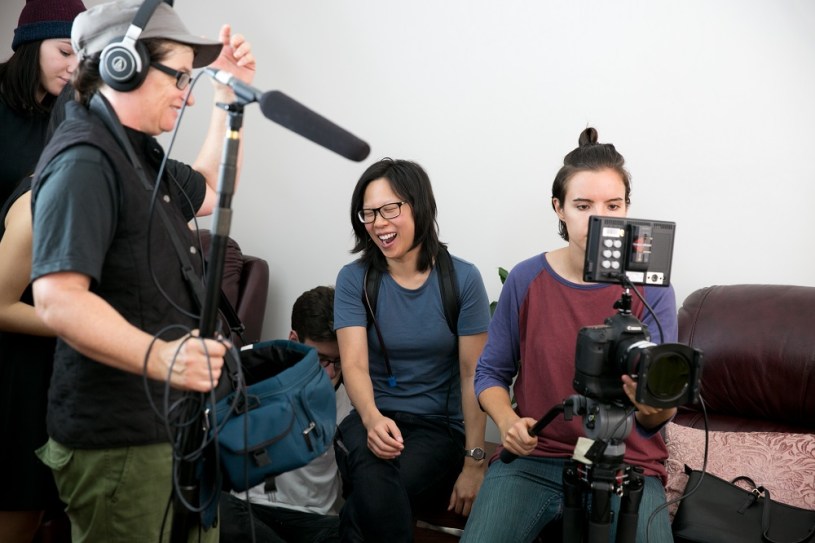(L-R) Ingrid Rowell, Pearl Tan and Tara O’Connell (Photo credit: Cassie Bedford).
Pearl Tan juggles so many roles – writer, director, teacher, PhD student, occasional ABC radio presenter and inclusivity activist – it’s surprising she hasn’t cloned herself.
The filmmaker’s day job as senior lecturer in directing at the Australian Film Television and Radio School gives her time to pursue extra-curricular projects as well as studying part-time for her PhD at the University of New South Wales.
Currently she is developing with creator/writer Amy Stewart and producer Kala Ellis Return to Sender, an online satire about two estranged, mixed-raced sisters.
The project won the inaugural Screen Australia/VidCon pitching competition Pitcher Perfect staged at VidCon in Melbourne last September. The creative team is using the $30,000 prize to craft a proof-of-concept.
Asked how she juggles so many roles, the Perth-born Asian Australian filmmaker and former actor tells IF: “I am very organised and focused on time-management.”
Romina Accurso is the script editor/lead writer on the six-part Return to Sender and Paul Ryan is also taking part in the writers’ room.
The goal is to apply for production funding and to shoot in the latter part of this year, with Amy Stewart and her sister Courtney Stewart (whose mother is Chinese) playing the sisters. They see Facebook Watch as the ideal launch platform.
A NIDA graduate in 2005 who taught acting at that institution and at the Actors Centre Australia, she says: “I love teaching. I always wanted to find a way of giving back and staying in touch with students and emerging creators. The process of teaching hones my craft.”

Contracted to AFTRS for a further three and a half years, she looks after the students who are studying directing for their Bachelor of Arts. “AFTRS is incredibly supportive of finding ways for their staff to stay relevant in the industry and having connections,” she says.
“At AFTRS we are very lucky we are connected to industry so students get to hear a lot from many people who have taken different pathways and options. Storytelling is something you have to do as a creator and we see that with our dedicated and passionate students.
“We don’t know where they will end up and which of them will ‘make it’ and to what extent. But if they are going to dream we give them the skills to get as close to that as possible.”
Her PhD, which she hopes to complete in five years, is in creative practice, examining intersectionality as a lens into screen culture and production processes.
Broadly, that means seeing race, class and gender as part of overlapping and interdependent systems of discrimination or disadvantage.
“I will be looking at policy and what we can do to create fresh, interesting content that encourages diversity but not in a siloed, one-axis way,” she says.
As a co-founder of Equity’s Diversity Committee, she welcomes the movement here and globally towards greater inclusivity, including initiatives such as Gender Matters and Screenability.
But she raises one concern: “In the process of elevating different under-represented groups it’s important that we don’t replicate the patterns of past subjugation or unconscious bias.
“So with Gender Matters, for example, we have to make sure there is a diverse range of women in the screen industry, including queer, disabled and from different races and cultures.”


